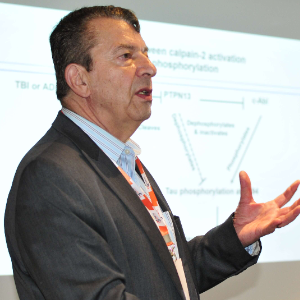Title : Calpain-2: A new target for the prevention of neurodegeneration
Abstract:
Numerous reviews have discussed the role of calpain in neurodegeneration in general, and in stroke and Traumatic Brain Injury (TBI). Consequently, numerous studies have attempted to use calpain inhibitors to reduce neurodegeneration in both stroke and TBI. While some studies have reported some positive effects of calpain inhibitors in TBI, other studies have not confirmed these results. Recent studies concluded that even two blood-brain barrier- and cell-permeable calpain inhibitors, SNJ-1945 and MDL-28170, did not have sufficient efficacy or a practical therapeutic window in a model of controlled cortical impact (CCI). While those non-isoform selective calpain inhibitors were shown to inhibit overall calpain activation (without distinguishing which calpain isoform was targeted) following TBI, they failed to provide neuroprotection. Several reasons could account for the failure to develop clinical applications with such inhibitors, including their lack of specificity/potency/selectivity, and the incomplete knowledge regarding the functions of the major calpain isoforms in the brain, e.g., calpain-1 and calpain-2 (aka µ- and m-calpain). Work from our laboratory over the last 5 years has shown that calpain-1 and calpain-2 play opposite functions in both synaptic plasticity and neuroprotection/neurodegeneration. Thus, calpain-1 activation is required for theta burst stimulation-induced long-term potentiation (LTP), and is neuroprotective. On the other hand, calpain-2 activation limits the magnitude of LTP and is neurodegenerative. In addition, we found that ischemia-induced damage to retinal ganglion cells was exacerbated in calpain-1 knockout mice, indicating that calpain-1 inhibition is likely to counteract the potential beneficial effects of calpain-2 inhibition. These findings could explain the failure of the previous studies to convincingly demonstrate the role of calpain in neurodegeneration and the lack of clear efficacy of the previously tested calpain inhibitors, which did not discriminate between calpain-1 and calpain-2. We will review the evidence that supports the notion that calpain-2 is a good target for preventing neurodegeneration using our work with a mouse model of TBI. In addition, we will discuss a new link between calpain-2 activation and tau phosphorylation.




